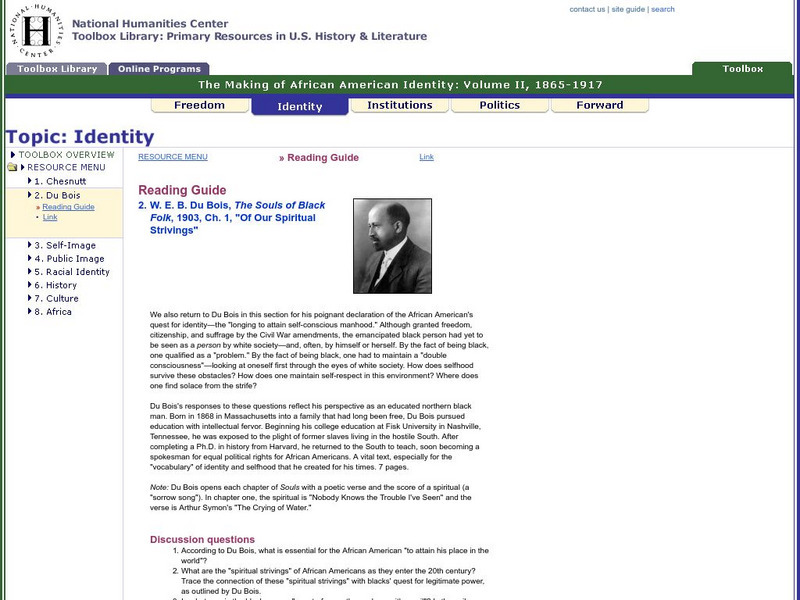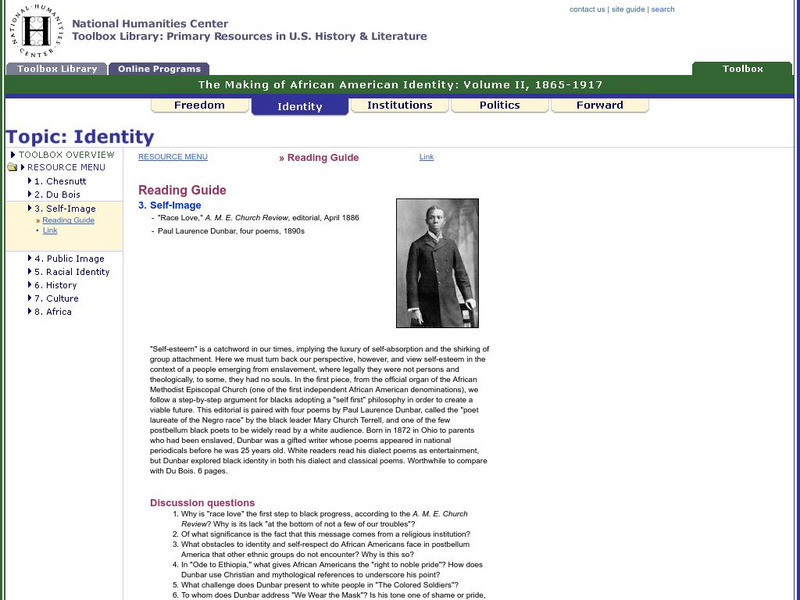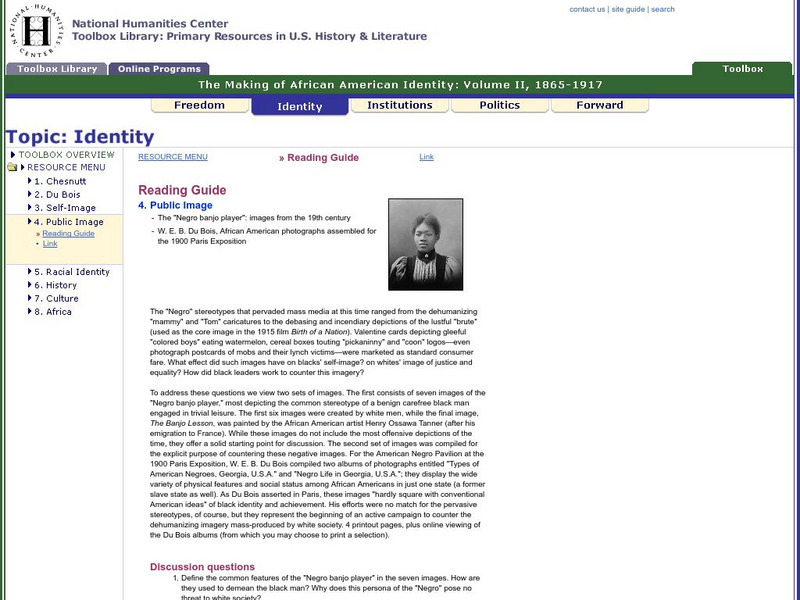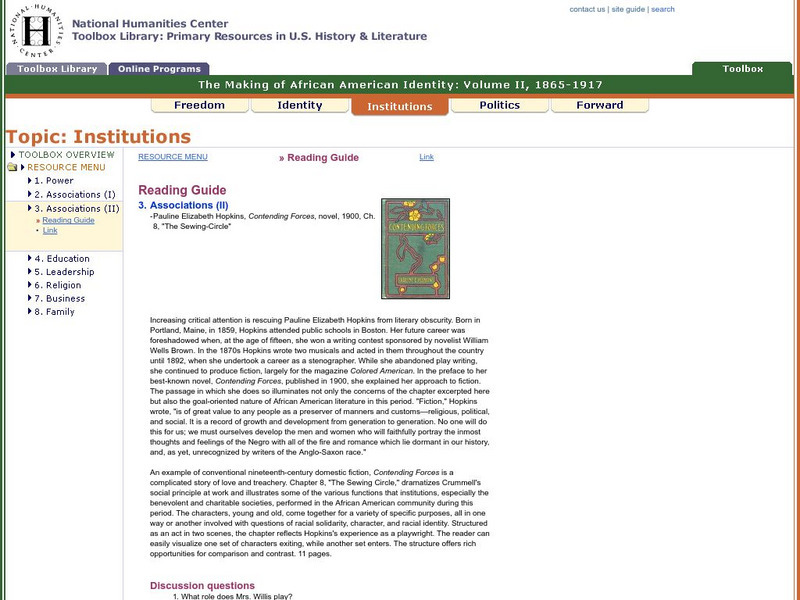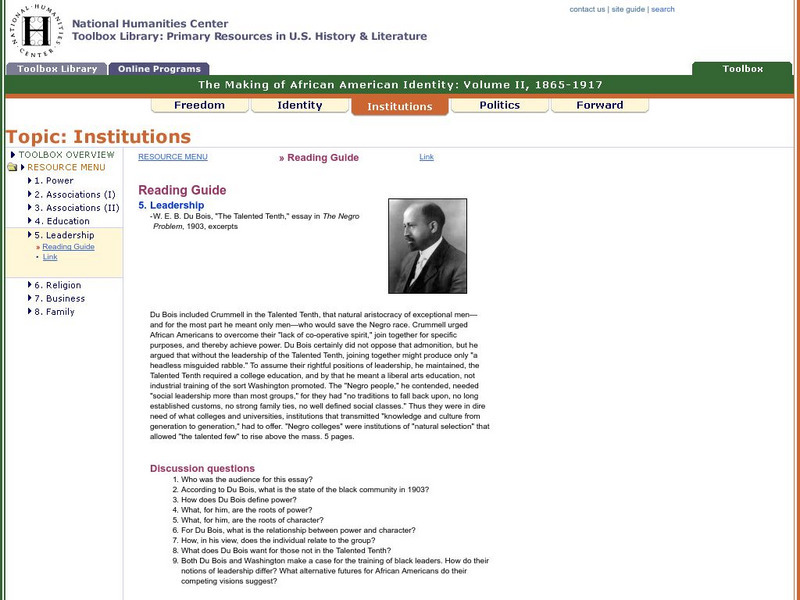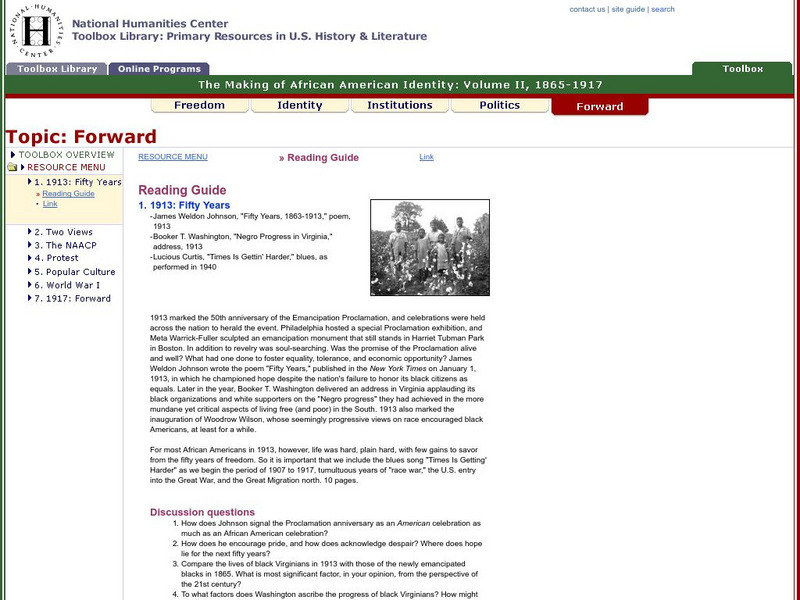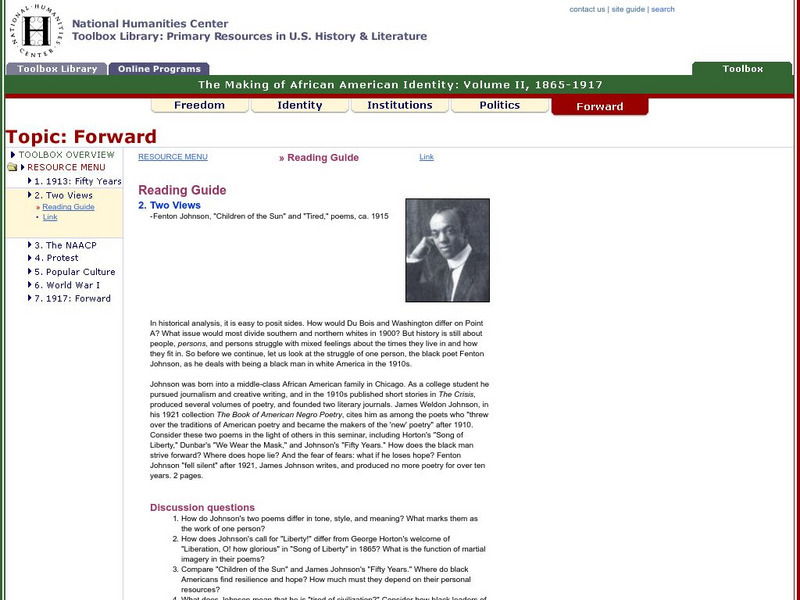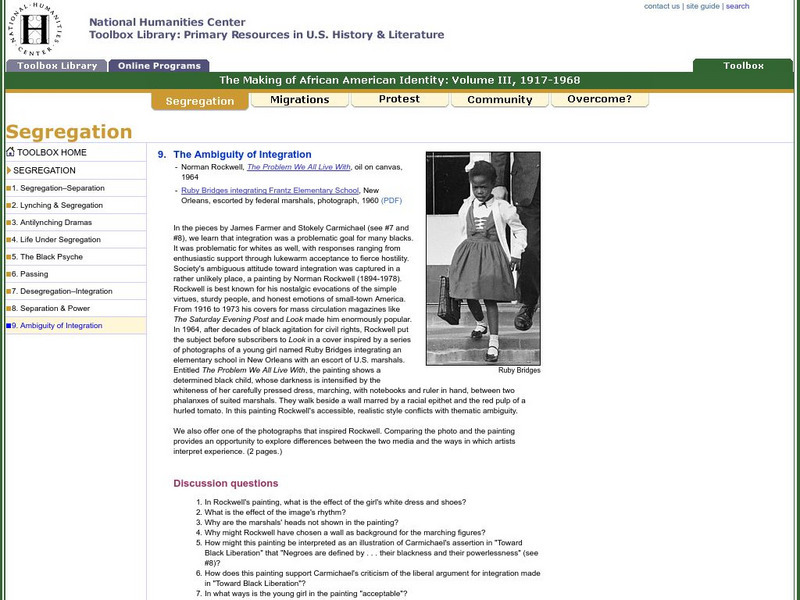National Humanities Center
National Humanities Center: Toolbox Library: Making of African American Identity: w.e.b. Du Bois, Souls of Black Folk
A chapter that explores how white perceptions influence African American identity. Although granted freedom, citizenship, and suffrage by the Civil War amendments, W. E. B. Du Bois explains how the emancipated black person had yet to be...
National Humanities Center
National Humanities Center: Toolbox Library: Self Image, Making of African American Identity: V. 2
An editorial and four poems that explore African American strivings for self-esteem in the late-nineteenth century. All documents referenced within this resource attempt to shine a light on African American self-image and identity.
National Humanities Center
National Humanities Center: Toolbox Library: Making of African American Identity: Public Image
The resources examines images that illustrate and challenge black stereotypes of the late-nineteenth century, primarily focusing on W. E. B. Du Bois' African American photographs assembled for the 1900 Paris Exposition.
National Humanities Center
National Humanities Center: Toolbox Library: History, Making of African American Identity: V. 2
An art exhibit and a chapter that illustrate African American efforts to create a usable past. Aspects of African American history, character, and potential are illustrated within this resrouce through Edward Johnson's promotion of...
National Humanities Center
National Humanities Center: Toolbox Library: Culture, Making of African American Identity: Vol. 2, 1865 1917
A chapter, an interview, and film clips that illustrate cultural expressions of African American identity in the late-nineteenth century. Culture is explored during the turn of the 20th century within this resource and is supported by...
National Humanities Center
National Humanities Center: Toolbox Library: Institutions: Power
This sermon by Rev. Alexander Crummell calls for racial solidarity and self-help, forcefully addressing the question of why African Americans should have their own distinctive institutions.
National Humanities Center
National Humanities Center: Toolbox Library: Associations (I), Making of African American Identity: V. 2
Newspaper articles that illustrate how benevolent and charitable societies fostered racial solidarity among African Americans in late-nineteenth-century America are provided. Links to these articles can be found on the second page.
National Humanities Center
National Humanities Center: Toolbox Library: Associations (Ii), Making of African American Identity: V. 2
Chapter from a novel that describes the workings of a charitable society. This chapter, "The Sewing Circle," illustrates some of the various functions that institutions, especially the benevolent and charitable societies, performed in...
National Humanities Center
National Humanities Center: Toolbox Library: Education, Making of African American Identity: V. 2
Chapters and photographs in which Booker T. Washington promotes manual education for blacks. In this resource, Washington makes his case for the practical, trades-based education he installed at the Tuskegee Institute.
National Humanities Center
National Humanities Center: Toolbox Library: Leadership, Making of African American Identity: V. 2
Essay in which W. E. B. Du Bois discusses the need for a black elite. This essay, "The Talented Tenth" is provided, illustrating his efforts to improve the social standing of African Americans.
National Humanities Center
National Humanities Center: Toolbox Library: Institutions: Religion, Making of African American Identity
Scholarly article and an address that discuss the role of religion in the shaping of African American identity during the late-nineteenth century.
National Humanities Center
National Humanities Center: Toolbox Library: Business, Making of African American Identity: V. 2
A painting and an appeal that explore the role business played in black uplift in nineteenth-century America. This resource focuses on the work of Edward Bannister (1828-1901), one of the leading black painters of the nineteenth century.
National Humanities Center
National Humanities Center: Toolbox Library: Family, Making of African American Identity: V. 2
A short story and photographs that illustrate the role family played in shaping African American identity in nineteenth-century America. A link to "The Stones of the Village" by Alice Dunbar-Nelson supports this concept.
National Humanities Center
National Humanities Center: Toolbox Library: Racial Politics, Making of African American Identity: V. 2
Chapter from a novel and images that illustrate black political action in late-nineteenth-century America. Frances Harper's 1892 novel Iola Leroy, is examined, covering topics of white supremacy and racial justice.
National Humanities Center
National Humanities Center: Toolbox Library: Race Problem, Making of African American Identity: V. 2
A poem, an address, and a painting that illustrate black political struggle in late-nineteenth-century America. This series of resources characterize "the Negro Problem" as "a concrete test of the underlying principles of the great...
National Humanities Center
National Humanities Center: Toolbox Library: The Vote, Making of African American Identity: V. 2
An appeal for black voting rights and an editorial cartoon opposing them. This resource explains that while the 15th Amendment granted black men the right to vote, southern states fought to block its implementation.
National Humanities Center
National Humanities Center: Toolbox Library: 1913: Fifty Years, Making of African American Identity: V. 2
A poem, an address, and a blues song that express black life in the first fifty years after the Emancipation Proclamation. The texts examine whether the true meaning of the proclamation carried forward to the lives African Americans.
National Humanities Center
National Humanities Center: Toolbox Library: Two Views, Making of African American Identity: V. 2
Two poems that explore the struggles of African Americans in the early-twentieth century. Links to both poems by Fenton Johnson are provided, and illustrate the struggles experienced as black man in white America in the 1910s
National Humanities Center
National Humanities Center: Toolbox Library: Popular Culture, Making of African American Identity: V. 2
A sculpture, poster, poem, and a painting that challenge black stereotypes in the early-twentieth century. Links to these precursors to the Harlem Renaissance are provided at the top of the page.
National Humanities Center
National Humanities Center: Toolbox Library: Making of African American Identity: World War I
Excerpts from "The Official History of the American Negro in World War I" by Emmett J. Scott, depicting the impact of the Great War on African Americans at home. The doubts that whites voiced about African Americans' loyalty and military...
National Humanities Center
National Humanities Center: Toolbox Library: Making of African American Identity: Forward:1917
Letters, an article, a pamphlet, and a song that point to greater black migration from the South and black cultural achievements in the twentieth century. The texts examines how migrations north affected the relationships of African...
National Humanities Center
National Humanities Center: Toolbox Library: Lynching and Segregation: Making of African American Identity
Primary source articles discusses mob violence and the practice of lynching while examining social conformity and segregation. Links to both articles, summary of text and questions for discussion.
National Humanities Center
National Humanities Center: Toolbox Library: The Black Psyche, Making of African American Identity: V. 3
Woodcuts that explore the effects of segregation on the black psyche. Links to Elizabeth Catlett's "The Negro Woman," a series of fifteen linoleum cuts are provided, as well as a summary of their meaning.
National Humanities Center
National Humanities Center: Toolbox Library: Ambiguity of Integration: Making of African American Identity
A painting and a photograph illustrating some of the problems posed by racial integration. Norman Rockwell's illustration is compared to the experiences of Ruby Bridges.


